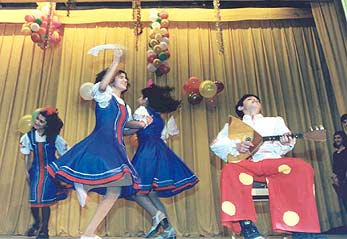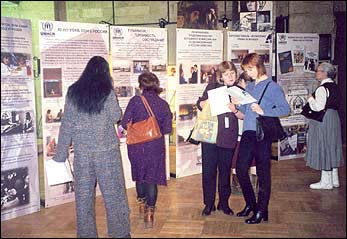Feature: Reaching out to asylum seekers in Russia
Feature: Reaching out to asylum seekers in Russia

MOSCOW (UNHCR) - The camera zooms in on a stooping, dark-skinned man of Central Asian origin standing bewildered as Muscovites pass him in every direction. In broken speech he tries to find his way, though the passers-by offer no assistance. Alone in a crowd, excluded by ethnic, linguistic and social barriers, this experience is universal for the majority of asylum seekers living in Moscow.
Removing his disguise, Anatoly Kuznetsov reveals himself as the famous Russian actor recognised by all. His message to his fellow citizens: "It's hard to show compassion for those who appear different from us, but they need our help. It was not by choice that they found themselves in this new land." This locally-produced UNHCR campaign highlights the situation of thousands of asylum seekers struggling to make their way in Russian society.
For many asylum seekers, the stress and trauma that forced them to flee their homes is enhanced by the problems they face in adjusting to a new, often hostile host society. The UN refugee agency's implementing partner, Gratis, is taking steps to help asylum seekers adjust to these difficulties.
Projects targeting the male population involve psychotherapeutic elements to address symptoms of post-traumatic stress, depression and other psychological disorders arising from the refugee experience. In addition, Gratis offers counselling sessions and workshops to help male asylum seekers cope with feelings of loss and powerlessness as the restrictive legal environment makes it hard for them to fulfil their traditional role as providers for the family.
For women, socio-cultural integration is even more elusive. In particular, many Afghan and Iraqi women, whose traditional sphere is the household, have little exposure to Russian society. With few opportunities to interact with the local population, many have limited knowledge of the Russian language and few marketable skills. Many women are isolated even from their own traditional support networks, as they are dispersed across the city and do not have well-developed community structures.
One project, the Women's Club at Kuzminki community centre, works to develop community-led self-help groups. Refugee women are trained in personal stress management with a view to developing their own self-help group. Members are expected to teach their relatives and friends in these methods. This helps to reduce the isolation and stress faced by asylum seekers, strengthen grassroots social support, and help them adapt to the challenges of life in Russia.
Gratis also helps integrate children through a range of projects designed to prepare students for enrolment in local schools. Work with children involves individual counselling, group therapy, art therapy and cross-cultural programmes with Russian youth. By providing psychological support to children suffering from post-war trauma, such programmes strengthen their ability to integrate in local schools.
Recognising the importance of education for the integration and adaptation of refugee children, basic education has been provided by UNHCR's implementing partner, Equilibre-Solidarity. Another partner, Ethnosfera, has co-operated with the Department of Education in Moscow and School No. 729 to set up a programme to enable over 100 Afghan children to study with Russian children.
Since February 2002, asylum-seeker children have had the right to study alongside Russian children in local schools. This follows an instruction from the Moscow authorities to schools that removed the barrier of residence registration as a prerequisite to enrolment.
In addition, UNHCR assists Ethnosfera to overcome other problems in integrating asylum seeker children into local schools, such as poor Russian skills and lack of preparation in basic subjects. With the refugee agency's help, the Moscow Department of Education and Ethnosfera now have preparatory classes for all six- to 12-year-olds registered with UNHCR who are not already in local schools.
While it is important for young asylum seekers to study within the Russian education system, it is equally important that they maintain a connection with their own cultural and linguistic heritage. Thus, Afghan children at the UNHCR-sponsored Perovo community centre have the opportunity to study their native Afghan languages (either Dari or Pashtun) and are also schooled in the Islamic traditions of their homeland.
Another problem asylum seekers face is the attitudes of the local population. Refusal to rent living quarters to asylum seekers is one common form of discrimination. The housing situation of many asylum seekers is thus extremely insecure, with many forced to relocate every few months. They report terrorist allegations by neighbours, or acts of intimidation intended to force them out of the neighbourhood. In extreme cases, asylum seekers find they have nowhere to live. UNHCR is aware that a number of African and Arab asylum seekers have been forced to seek shelter in the sewer system on the outskirts of the city.
Moreover, increasingly public displays of xenophobia by neo-Nazi and far-right Russian nationalist youth gangs are posing a serious threat to the physical safety of asylum seekers, particularly those of African nationality. According to Noel Calhoun, a community services officer at UNHCR, between 30 and 40 cases of racist violence are reported every month in Moscow; a much greater number are believed to go unreported.
In August 2001, Angolan asylum seeker Paul Massa Mayoni was attacked by a group of young Russian men while talking with friends outside the Refugee Reception Centre. He later died from his injuries. Tragically, such acts very rarely elicit a response from the police, who have been accused of discouraging victims from reporting incidents of racially-motivated violence. In the case of Mayoni, the authorities only took action after vigorous pressure from UNHCR. A charge of "hooliganism committed using arms" was brought against one assailant, while two others were freed on bail. A charge of "inciting racial hatred" was not accepted in the courts.
As a result of frequent attacks, some asylum seekers live with a siege mentality. Makemba Nguesso, a Congolese asylum seeker whose husband was attacked on a commuter train, says she prefers him to stay home. "My husband used to go out every morning looking for work, but I beg him to stay home now. Ever since he was attacked, I'm just so scared. It's better for us to stay home eating only bread and tea than for him to go out and maybe get killed."
Sergey Burlik, a police liaison officer at the Refugee Reception Centre, keeps data on incidents of racist violence against asylum seekers, but worries that the statistics do not represent the reality. "Typically we get about four or five reports of attacks per month, but this figure is very low. Asylum seekers do not want to report because, having no documents, they are afraid of what the police will do to them."
Morgan Woolfe, head of UNHCR's Resettlement Unit, frequently encounters resettlement applicants who have only recently been attacked. "It's normal to see the Africans with fresh bruises or cuts around their eyes."
The problem is so severe that many asylum seekers of African nationality have submitted applications and been accepted for resettlement. The Resettlement Unit supports cases for third-country resettlement when neither local integration nor repatriation is considered an appropriate or possible durable solution, and when resettlement would resolve severe protection problems.
Essentially, the determination of the Resettlement Unit is that, for many African asylum seekers living in Moscow, there are few prospects for local integration, though determinations are made on a case-by-case basis. And while black Africans are considered to be particularly vulnerable to racist attacks, UNHCR is also aware of many assaults against Afghans, Iraqis and other asylum seeker groups.
To raise public awareness and promote acceptance of asylum seekers in the Russian Federation, UNHCR co-ordinates a number of programmes at the local, regional and national levels.
Equilibre-Solidarity organises musical, theatrical and artistic events several times a year. The annual Zelenogradskii Summer Music Festival, for example, provides a space for people from Russian and asylum seeker communities to learn about each other's musical traditions and national costumes while sampling ethnic cuisine.
In another project, a group of psychologists working with Gratis has organised awareness-raising events to promote intercultural tolerance between asylum seekers and Russian youth. Youth from UNHCR community centres join Russian primary and secondary school students in a day of activities involving games, performances, artwork, and lectures on the value of diversity and the importance of respecting racial and cultural differences.
A similar project, "A Lesson of Tolerance," is co-ordinated by UNHCR in collaboration with the newspaper, 1st September, and aims to raise awareness of refugee-related issues among children in Russian schools nation-wide.
The UN refugee agency's Public Information Unit organises public awareness campaigns in the form of television spots, radio programmes, newspaper articles and special events to educate the public at large about the distinction between asylum seekers and economic migrants. The most far-reaching project is a weekly radio programme, "New Place of Residence," aired on "Radio of Russia," with an audience of several million people.
In another awareness campaign, UNHCR, in collaboration with the Association of Regional Media Managers, organises workshops for journalists of regional and Moscow newspapers and provides regular press briefings, interviews and articles to the Russian media. In 2002, a contest for the best publication on refugee-related issues was held, drawing 150 journalists from various regions of Russia.

For the past five years, UNHCR has also been participating in the International Human Rights Film Festival "Stalker," during which members of the public are invited to watch films on refugee rights and the difficult circumstances they face in seeking asylum. A special UNHCR day was held during the 2002 festival, attracting over 4,000 spectators. In addition, over 30 representatives of governmental and non-governmental organisations, as well as the media, attended a round-table conference, "The Role of Cinema in Protecting Refugee Rights." The festival invites people to think about the rights they enjoy but sometimes take for granted.
Hopefully, all these efforts will help educate the public and empower people of concern to UNHCR such that one day, refugees and asylum seekers can walk down the streets of Moscow with their heads held high, with a clear sense of direction and no fear of discrimination in their adopted homeland.
By Matthew Scott
UNHCR Moscow








